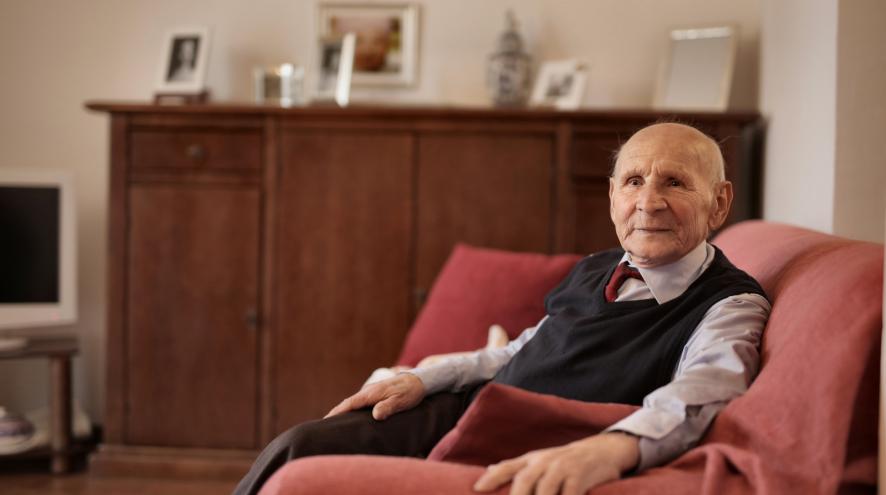COVID-19 resources for people caring for someone in long-term care
Information on visiting and providing support for someone living in long-term care during COVID-19.

Caring for someone living with dementia in a long-term care home
Due to the restrictions on visiting long-term care homes, many people are unable to visit their family members as they usually would. Caregivers of people living in long-term care homes may experience frustration, anxiety, fear, sadness, grief, or guilt. Recognizing and acknowledging the feelings you are experiencing can help you to manage how you cope with this stressful situation.
Consider alternative ways of staying connected with your family member in long-term care:
- Can you talk to them on the phone or visit over Skype?
- Can the staff deliver a message for you?
- Can staff provide you with updates by phone or email?
This is a difficult position to be in. Try to remind yourself that this situation is only temporary. See section: “Self-care and caregiver resilience during COVID-19” for self-care tips.
Visiting someone living with dementia in long-term care
New visitor guidelines went into effect on April 1, 2021.
For further details and updated information on visits, please refer to the BC Centre for Disease Control’s page: Long-Term Care Facilities & Assisted Living guidance.
Before your visit:
- Familiarize yourself with the procedures and precautions for your care home.
- Prepare yourself to experience a variety of emotions when seeing your family member after months of being apart; this could include relief, guilt, sadness and grief or anger and frustration.
- Keep in mind that you may feel shock at any changes to their appearance or health (such as weight or mental health). However, appearance does not always reflect the level of care being received. For example, a person’s hair may appear unkempt because of limited access to hair stylists before restrictions to visitation were reassessed.
- Consider the perspective of the person living with dementia. For example, the person may not understand why you are wearing a mask and become anxious or disoriented.
See our information sheet “Before the visit” for more tips and information.
During your visit:
- For many people living with dementia, masks make it challenging to recognize a person or follow a conversation with them. Do your best to exaggerate your facial expressions so that they are visible above the mask, use gestures to communicate and speak slowly and clearly.
- Use positive language when talking about COVID-19 and the precautions, such as, “This mask does look funny, doesn’t it?” or “How wonderful we can see each other again.”
- Remember that it may be a bad day. If a person is feeling tired or depressed, they may have greater difficulty recognizing you. If possible, try booking your next visit at a time that works better for your family member.
See our information sheet “During the visit” for more tips and information.
After the visit:
- Give yourself time to adjust to the changes in visitation. Recognize that you are doing the best that you can considering the difficult circumstances. It will take some time to adjust and figure out new routines. Keep in mind that the Ministry of Health will continue to reassess visiting guidelines as the COVID-19 situation evolves.
If you observe changes in the person’s care (for example, medication, restraint use, etc.) or are not satisfied with what you observe during your visit, you should request a meeting to discuss these changes with the care team. While urgent decisions may have been made by the care team over the past few months, you are entitled to be involved in these decisions going forward if you are a substitute decision-maker.
See our information sheet “After the visit” for more tips and information. To download the full visitation guide, click here.
Keeping in contact with loved ones from a distance
It can be incredibly difficult to not be allowed to maintain regular visits with your loved one, but there are many alternative modes of communication to keep in touch.
- Stay in contact with family and friends over the phone, and if you can, make use of face-to-face technology such as FaceTime or Skype.
- If the person living with dementia is more confused or tired at certain times of the day try to schedule calls when they will be alert and engaged.
- If there are times of the day when they become anxious or agitated, try to schedule calls at a time when the person may need reassurance.
- Try to reach out to the staff and discuss the best way to keep in touch, although bear in mind that their responses may be delayed as workers will have many enquiries during the current crisis.
Additional resources
Consider contacting the First Link® Dementia Helpline for information and support. In addition to crucial emotional support and a listening ear, callers can access information about living with dementia during COVID-19 including practical strategies on a variety of topics, such as behavioural and communication challenges.
- English: 1-800-936-6033 (9 a.m. to 8 p.m., Monday through Friday)
- Punjabi: 1-833-674-5003 (9 a.m. to 4 p.m., Monday through Friday)
- Cantonese or Mandarin: 1-833-674-5007 (9 a.m. to 4 p.m., Monday through Friday)
Further support is available through our webinars, which are held every week. Register for our upcoming webinars on our website or explore our recorded videos which are available 24/7 to learn about many more topics related to caregiving for a person living with dementia. Previous topics that may be of particular help include:
